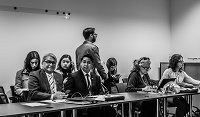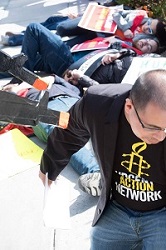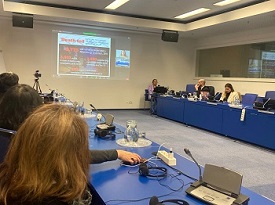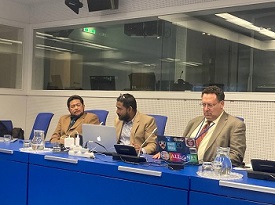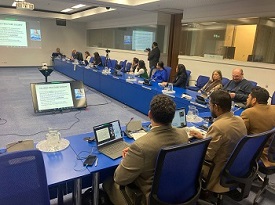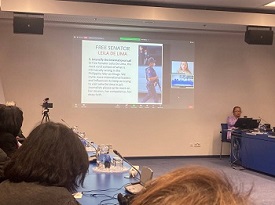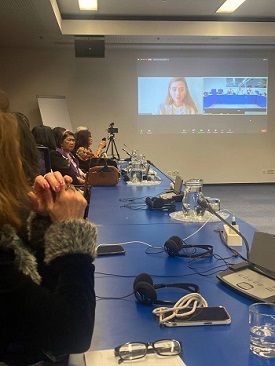StoptheDrugWar.org's Rule of Law program (previously referred to as our Philippines program) engages serious human rights abuses in the global drug war. Still having a primary focus on extrajudicial killings in the Philippines, the program has help to draw attention to former President Rodrigo Duterte's drug war killing campaign that NGOs believe has taken the lives of 30,000 people without trial, and in which killings still continue at a reported rate near one per day.
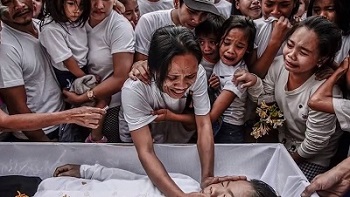
Our mainstay since 2017 has been events at United Nations and other international meetings. We have to date (as of 2/1/24) held 15 such events that in whole or part have addressed extrajudicial drug war killings -- Philippines but also similar problems in Indonesia, Bangladesh and Brazil -- and related democracy issues. In 2024 we are additionally launching a standalone series on Zoom, including the afore-described topics, but also issues like geopolitics as it affects international human rights efforts and how survivors of Duterte's drug war are moving forward.
a powerful video for our March 2017 UN event. |
Our first event, in March 2017 featured a powerful video by then Vice President of the Philippines, Leni Robredo, which strongly criticized the Duterte drug war. This video drew international press coverage, following our initial exclusive release of it to TIME.com, and quickly gained traction in the Philippines.
A few days later, allies of President Duterte seized on the fact of the video along with other events in order to create a political attack on Robredo, accusing her of orchestrating a plot to "destabilize the government." This led to an attempt to impeach Robredo for the video, which raged in the media for several weeks but was ultimately unsuccessful.
The program also advocates for national and global human rights measures, through advocacy with civil society networks like the Coalition for the International Criminal Court and the "GloMag" Coalition on targeted sanctions for human rights violations and corruption, and to the US Congress and executive branch agencies. An unanticipated result of our networking in these communities was a successful effort by allies to secure US government sanctions for drug war killings on leaders of the Bangladesh Rapid Action Battalion in December 2021.
This program grew out of work we engaged in at the UN in the lead up to the 2016 UN General Assembly Special Session on the World Drug Problem (UNGASS), and our accreditation later that year with Special Consultative Status at the UN Economic and Social Council (ECOSOC). This status is what allows us to organize events at UN sessions under our own name. Visit https://stopthedrugwar.org/global to read more about our work for the UNGASS with policymakers, civil society and media, and our at the UN since then for broad global drug policy reform.
We are currently seeking $127,000 in 501(c)(3) program funding for 12 months of work by the Rule of Law in Drug Policy program, to begin as soon as possible in 2024. This amount includes $30,000 designated for a special effort in March 2024 that is not yet announced, but for which we can provide information privately on request.
Following below is the nearly seven-year record of this program, presented in chronological order. Additional pages, soon to be published, will present subsets of this work which has dealt directly with democracy, disinformation, targeted sanctions, the ICC, extrajudicial drug war killings in Indonesia, Brazil and Bangladesh, and our advocacy in support of recently-released Philippine former Senator Leila de Lima.
Vienna March 2017 event and Vice President Robredo's UN video
Our first UN side event, held in March 2017 at the UN Commission on Narcotic Drugs annual meeting in Vienna and coorganized with the Manila-based Council of Asian Liberals and Democrats, drew massive attention in the Philippines, due to a speech by video from Philippines Vice President Leni Robredo that led to unfair attacks on her by Duterte allies and an (ultimately unsuccessful) impeachment drive. The video also garnered US and international coverage. Robredo's video strongly criticized Duterte's drug war, as well as Duterte-led moves in the Philippine Congress (also unsuccessful) to reinstate the death penalty, including for drug offenses, and to lower the age of criminal liability to nine.
We released the video on Monday March 13, three days before our event, offering TIME magazine the exclusive first posting. TIME followed up with an interview with Robredo. Along with extensive coverage in Philippine mainstream media, discussion of the video trended on Twitter, and was covered by wire services and outlets throughout Asia and the Gulf.
Unfortunately though not surprisingly, Duterte's forces hit back. The Speaker of the Philippine House of Representatives and the president's Spokesperson both claimed the vice president's office (OVP) must have timed the video's release to coincide with other events that week. They principally pointed to an impeachment complaint a congressman filed against Duterte the day after we released the video, as well as a resolution in the European Parliament calling for the release of Duterte critic Sen. Leila de Lima. They presented this as evidence Robredo was engaged in a "destabilization campaign" against the government.
| |
video to attack her politically. |
While still in Vienna, we released a statement to media refuting those claims. It documented that UN staff had scheduled side events for the CND nearly two months earlier, and attested that OVP had made no requests of us. (Our event appears on page ten of the 2017 CND side events list; a screenshot of that document's properties page shows it was published on January 23, compared with the event's March 16 date.) Sen. Kiko Pangilinan distributed the statement to the Liberal Party's media list, and we also contacted Philippine media. CNN Philippines, on which the president's spokesperson had first made the false claim about the role of the video, published the most extensive story about our debunking of it. (See news links below.)
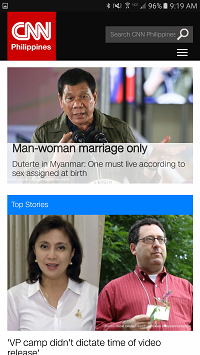 | |
defending the vice president, CNN Philippines mobile home page |
While our statement helped to defuse the specific charge of a coordinated campaign by the vice president, Duterte's team had ignited a political firestorm over the video which already had its own momentum, and which turned into a campaign to impeach Robredo. At the height of the furor, opportunistic celebrities even held a concert and rally against Robredo. (Their campaign reached the US west coast, when a Filipino American group in Hayward, California held an affinity rally.)
The political heat that Robredo, a human rights lawyer, took for participating in our event is unfortunate. But she has continued to speak out against the killings, and remains a popular figure.
News reports on our event, the vice president's video, and its fallout, are too numerous to link here, and media continued for a long time to refer to them when discussing the vice president's political trajectory. One example is this analysis in the prominent Philippine news outlet Rappler, as of late 2019 ranked as the 10th more read web site in the Philippines. We post here a selection of key news links, as well as links for video footage of our entire event and other resources.
| |
government's response. (photo by Joey Tranchina) |
Event footage is available online here. Along with the Robredo statement and an Amnesty International video, it includes presentations by the late Chito Gascon, who served as Chairperson of the Commission on Human Rights of the Philippines; Abhisit Vejjajiva, former Prime Minister of Thailand and current chair of event cosponsor the Council of Asian Liberals and Democrats (video); Lousewies van der Laan, former leader of the Dutch D66 party (Skype); Alison Smith, lead counsel and head of international criminal justice programs at the NGO No Peace Without Justice; Marco Perduca, former Senator from Italy and a member of our board of directors; and a written statement from US Rep. Earl Blumenauer (D-OR). We also have transcripts and a detailed summary.
 | |
Co-moderator Marco Perduca, former |
Following are some key news article and related links:
- TIME: Philippine Vice President Slams Duterte's Drug War in a New Video
- TIME: 'Democracy Demands Dissent': Philippine Vice President Condemns Duterte's Drug War in Q&A With TIME
- Reuters: Philippine VP decries Duterte's drug war tactics in video to U.N.
- Agence France-Presse: Philippine Vice-President Leni Robredo slams drug war
- Philippine Star: WATCH: Robredo's message to UN narcotics body
- Inquirer: Robredo brings fight against Duterte to UN
- ABS-CBN: Robredo on UN video message: No regrets
- Rappler: Robredo only stated facts in UN video, says spokesperson
The Philippines' largest broadsheet newspaper and 8th most read web site in the country at that time, The Inquirer, interviewed our executive director David Borden, as well as fellow event speaker Alison Smith, two weeks after the event. The interview, titled "Group says Duterte, not Robredo, upsetting int'l community," was widely read, shared by Inquirer readers nearly 9,000 times.
A transcript of the video was posted on Vice President Robredo's web site.
Articles covering our statement defending the vice president against the Speaker's false attack:
- eaglenews.ph, 3/16
- ABS-CBN (Philippines' leading TV news station, and the 4th most viewed web site in the Philippines as of this writing), 3/18
- GMA (Greater Manila Area) News Online, 3/18
- Liberal Party of the Philippines news release, posted on Senate web site, 3/18
- The Daily Tribune, 3/19
- CNN Philippines, 3/20
- Manila Standard, 3/20
Articles covering our publishing of the full event footage:
Global Sign-On Statement for ASEAN Summit, November 2017
In the lead up to the November 2017 Summit of the Association of Southeast Asian Nations (ASEAN), which was hosted by Duterte in the Philippines, we organized a global sign-on statement which calls for a UN-led investigation of the drug war killings; for the leaders of ASEAN member states and other world leaders attending to speak up about the issue; and for international aid donor governments to impose human rights conditions on law enforcement assistance to the Philippines, while funding positive programs that could serve as an alternative to the Philippine drug war, and funding the work of human rights advocates.
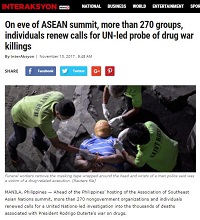 |
Nearly 300 NGOs and prominent individuals endorsed the statement. Of the 240 NGO endorsers, more than 50 are based in Asia, including a majority of ASEAN member states as well as India, Pakistan and Sri Lanka. There are also several Asia-wide networks devoted to issues such as HIV, transgender and drug user concerns, and youth democracy activism.
Some notable signatories on the document include the National Organization for Women (NOW), Doctors of the World, the Free Legal Assistance Group (FLAG, a nationwide Philippines human rights lawyers group founded during the Marcos dictatorship years), Treatment Communities of America, prominent human rights advocate and actor of MASH fame Mike Farrell, former police chief of Seattle Norm Stamper, and others.
A political component of the statement's outreach efforts, which was in its early stages at the time of the statement's release, secured endorsements from legislators in Canada, Italy, Cambodia, and Washington State, as well as other political and governmental officials from Singapore, Canada and the UK.
The statement was covered by four important Philippines news outlets:
- Global coalition calls for end to EJKs ahead of Trump's PH visit, Inquirer, 11/12/17
- Int'l coalition calls for 'decisive actions' against drug war killings in PH, Rappler, 11/10/17
- Groups call for international action to probe, stop drug war killings, Philippine Star, 11/10/17
- On eve of ASEAN summit, more than 270 groups, individuals renew calls for UN-led probe of drug war killings, InterAksyon, 11/10/17
The Interaksyon article credited our coalition with renewing global calls for a UN-led probe into the drug war killings.
Protest at Philippines Embassy, Washington, DC, February 2018
|
For the one-year mark of the jailing of Duterte critic Senator Leila de Lima on spurious drug charges (February 24, 2018), we organized a protest at the Philippine Embassy in Washington, DC. The event featured street theater with Duterte and Philippine National Police figures arresting Senator de Lima and pretending to shoot attendees.
Allies in the Philippines helped to promote the event's Facebook Live video stream, and it went viral in that country, with nearly 470,000 views as of this writing. Among our cosponsors in the action were Amnesty International, the Filipino American Human Rights Alliance and the Ecumenical Advocacy Network on the Philippines.
 |
Other Philippines-focused groups such as Gabriela-DC and the International Coalition on Human Rights in the Philippines-US participated as well. The event represented a step for Philippines-focused groups with various different ideological roots working together. Video of the action went viral in the Philippines, and has garnered nearly 470,000 views. Since that time our executive director, David Borden, has been a go-to person about the drug war for demonstrations organized by Filipino American groups.
- GMA News Online article: Anti-drug war group to protest at PHL Embassy in Washington, 2/23/18
- Inquirer article: Washington Street Theater Slams Duterte's 'War on Drugs', 3/2/18
Facebook Live video:
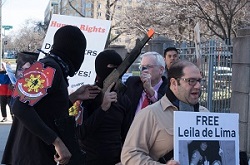
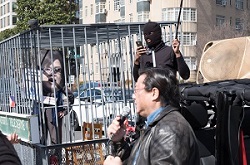
(photos and video done by event cosponsor DCMJ)
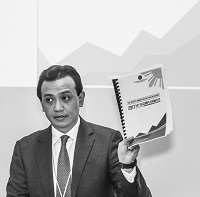 | |
of Duterte administration's 2017 report, listing 20,000 killings among its accomplishments (photo by Joey Tranchina) |
Vienna side event with Senator Trillanes, March 2018
A year almost to the day after our 2017 event (and in the same room at the UN), we held another event featuring outspoken opposition Philippine Senator Antonio F. Trillanes IV. (Duterte has said of Trillanes, "I [will] destroy him, or he will destroy me.")
In a sign of the times, the day before our event when Senator Trillanes arrived at the UN, President Duterte transmitted one-year notice of the Philippines withdrawing from the International Criminal Court, in retaliation for the ICC's preliminary investigation of his drug war. The night before our event, prosecutors in the Philippines indicted the senator on a spurious sedition charge.
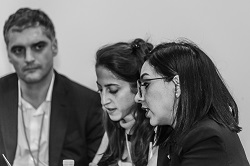 read Senator de Lima's statement. Alessandro de Luca also pictured. (photo by Joey Tranchina) |
Senator Leila de Lima contributed a written statement to our event as well. Joining Senator Trillanes as featured speaker was Ellecer Carlos, well-known spokesperson for the iDEFEND Philippine human rights coalition. The event was again co-moderated by David Borden and Marco Perduca.
 | |
(photo by Joey Tranchina) |
Roughly 70 people attended, many forced to stand outside the 30-person capacity meeting room. Attendees represented a range of governments, UN agencies, NGOs, and members of the local Filipino community.
While the sedition charge became the main news story, driving out much of the coverage our event might otherwise have gotten, we did get some media including television:
|
|
After Robredo, Trillanes Turn to Blast EJKs in war on drugs, Inquirer article published in advance of our event
State of the Nation with Jennifer Soho
Philtizen article noting State of the Nation report (over 9,700 shares on Facebook)
Trillanes not backing down on sedition case (The Philippines' top news outlet, ABS-CBN, filmed for this report at our event. The sedition indictment, which was issued the night before, became the main story.)
How many more Filipinos will suffer under Duterte? De Lima asks (Inquirer article -- over 7,700 shares)
Rights Reporter interview with Senator Trillanes
 | |
statement attributed to us |
In another sign of the times, Filipinos working in Vienna attended our event, including both supporters and critics of President Duterte. One member of the "Die Hard Duterte Supporters contingent (DDS -- a play on the infamous "Davao Death Squad" Duterte operated as mayor) challenged Senator Trillanes on the number of killings during the discussion time, while others videorecorded. The pro-Duterte media forces selectively edited the video in order to create an appearance that Trillanes didn't have an answer for him (as the senator and his staff had predicted). An example from a local newspaper in the Philippines appears here. Our Facebook Live video shows that Senator Trillanes did respond, however, and that the encounter was a civil one. The two spoke at length following the event.
Our visit to the UN cafeteria the day before the event led to a series of misleading and fake news stories. A Filipino cashier noticed Senator Trillanes was wearing an NGO badge, rather than one issued by the Philippines' Mission to the UN, and sent a picture to a pro-Duterte blogger. The blogger's post, which misidentified us as a Filipino American NGO, is online here, and has over 7,700 shares. An article posted on two Philippines-focused sites (here and here) "confirmed" that the senator had entered the UN through our auspices.
This information in these pieces isn't fake per se, but they attempt to imply a scandal or problem where there was none. A fake news story followed on the blog post, includes a photo of us on the lunch line with Trillanes, but claims falsely that the senator was "scolded" by a UN security guard who told him to "eat last." A follow-up fake news piece features a fabricated statement attributed to our organization. A third piece by the same writer provided video from our event of a Filipino Duterte supporter contesting Trillanes' information, but implied falsely that the senator fell silent instead of responding to him.
The Facebook Live video stream from this event follows below. We will post an edited playlist copy and transcript in the near future. In the meanwhile, a realtime transcript from the CND Blog can be read here, and individual speeches can be accessed by going to the following points in the video. (We're not able to link to specific times within Facebook videos.)
- Statement of Senator Leila de Lima, read by Tania Ramírez and Natalie Lyla Ginsberg (13:38)
- David Borden (20:17)
- Marco Perduca (21:03)
- Senator Antonio Trillanes (26:42)
- Ellecer Carlos (27:12)
- Discussion (59:20)
See our September 2018 statement regarding another attempt by the Duterte administration to imprison Trillanes, their most serious one yet.
New York side event, High Level Political Forum on Sustainable Development, July 2018
On July 16, we hosted the third event in the series, "Human Rights Challenge: Judicial and Extrajudicial Killings in a Time of Authoritarianism," expanding the scope of the discussion to include the death penalty for drug offenses. The event was held at the Church Center of the United Nations, in conjunction with the UN High Level Political Forum on Sustainable Development.
Prominent opposition leader Senator Risa Hontiveros of the Philippines provided a video for our event, calling for international solidarity for human rights and an end to Duterte's drug war. The two hour event also featured Professor Jason Wright of the Washington & Lee Law School, speaking on behalf of the California-based group Death Penalty Focus; and Justine Balane, International Secretary for Akbayan Youth in the Philippines, via Skype.
The largest Philippine news outlet, ABS-CBN, filmed the event, and a report ran on their US station, Balitang America.
Following is the Balitang America's YouTube copy of the TV report:
Following is full video of the event. An edited playlist copy and transcript will be posted in the near future. In the meanwhile, individual sections can be accessed by clicking on the time indications in this list:
- Welcome and Acknowledgments by David Borden, Executive Director, StoptheDrugWar.org (0:00)
- Video message from Senator Risa Hontiveros, Republic of the Philippines (4:16) | (original copy of Hontiveros video here)
- Remarks by David on Borden on the UN Sustainable Developments Goals, and Background for This Event (7:47)
- Justine Balane, International Secretary, Akbayan Youth (14:11)
- Professor Jason Wright, Washington & Lee School of Law, representing Death Penalty Focus (25:55)
- David Borden remarks (48:34)
- Invited remarks from audience by Shilpa Nandwani, Northeast Coordinator, International Coalition for the Philippines US Chapter (53:50)
- Invited remarks from audience by Terrenze Rienton (1:01:18)
- General Discussion (1:06:43)
- audience remarks by Rev. Levi Bautista (1:12:57)
- General Discussion (1:17:23)
launch of Stand with Human Rights and Democracy: Global Campaign for the Philippines, February 2019
In February 2019 we soft-launched "Stand with Human Rights and Democracy: Global Campaign for the Philippines," calling for an end to extrajudicial killings in the Duterte drug war and the release of Senator Leila de Lima. Events, held between February 23-25, took place in Freetown, Sierra Leone (SSDP Sierra Leone); Manila, Philippines; Mumbai, India; Oslo, Norway (); Sousse, Tunisia; and Washington, DC.
Vicente de Lima II, brother of Senator de Lima, spoke at the Manila action, which was a presentation during a major opposition rally by Tindig Pilipinas.
Due to lack of funding, we were not able to continue this part of our Philippines efforts. "Stand with Human Rights and Democracy" has continued, see https://DemocracyStand.global. Photos appearing in this video can be downloaded here. Artwork from the campaign can be viewed here. Philippine Canadian Inquirer article is online here. (We've linked to an Archive.org copy of the article because photos are no longer appearing on the Inquirer site's copy.)
CND side event with Chel Diokno, March 2019
In March 2019, we returned to the Commission on Narcotic Drugs meeting, where we were joined via Skype by Chel Diokno, Dean of the De La Salle University School of Law, and at the time a candidate for the Philippine Senate. Attorney Diokno's keynote speech garnered strong media attention in the Philippines, and a comment he made about the "erosion of the Philippine justice system" drew a response from Philippine Justice Secretary Menardo Guevarra.
With this event we also began to address the role of social media manipulation and disinformation in the Philippine crisis. The program included a presentation by video from a scholar of online disinformation campaigns, Pamela Combinido, whose group had interviewed the organizers and rank-and-file "trolls" who carry them out; and a video from BuzzFeed News on Facebook's role in fueling Duterte's drug war, which accompanied an award-winning article on the topic by technology reporter Davey Alba.
At the March 2019 CND annual meeting, we presented "Alternative Values, Alternative Facts: Drug Policy and Justice as Casualties in the Struggle Between Authoritarianism and Democracy." This event featured prerecorded presentations by leading human rights attorney, and at the time senatorial candidate, Chel Diokno; researcher Pamela Combinido, whose group interviewed organizers and rank-and-file "trolls" who carry social media disinformation campaigns; and a video from BuzzFeed News on Facebook's role in fueling Duterte's drug war, which accompanied an award-winning article on the topic by technology reporter Davey Alba. (Atty Diokno joined live discussion with attendees, but the video footage was not usable. The BuzzFeed video has also gone offline; BuzzFeed staff are looking into whether it can be restored.)
Diokno's statement prompted significant news coverage in the Philippines, particularly his statement that the Philippine justice system is "eroding," and elicited a response from then Philippine Justice Secretary Menardo Guevara.
Articles reporting on Diokno remarks:
- https://www.rappler.com/nation/politics/elections/2019/226355-chel-diokno-calls-for-more-international-pressure-duterte-government
- https://news.mb.com.ph/2019/03/23/diokno-tells-international-community-ph-legal-system-eroding/
- https://news.abs-cbn.com/spotlight/03/21/19/diokno-ph-drug-war-a-deliberate-attack-on-the-poor
- https://www.abante.com.ph/chel-huwag-lang-mga-pusher-mga-drug-lord-habulin-din.htm
- https://www.msn.com/en-ph/news/national/palace-wont-stop-righteous-indignation-vs-china/ar-BBV6cD9 (toward end of article)
Articles reporting on the Justice Secretary's reaction, which he emailed to reporters:
- https://news.mb.com.ph/2019/03/27/guevarra-assures-rule-law-intact-amid-ongoing-drug-war/
- https://abogado.com.ph/para-siyang-hindi-dean-guevarra-rebuffs-chel-diokno/
- http://www.pna.gov.ph/articles/1065647 (government news service)
Coverage reported by friends in the Philippines on radio stations DZMM and DZBB.
Pamela Combinido presentation: PDF and Powerpoint
side event for the High-Level Political Forum on Sustainable Development, July 2019
In July 2019, we held a side event for the HLPF at UN Headquarters in New York, "Alternative Values, Alternative Facts: Drug Policy and Justice as Casualties in the Struggle Between Authoritarianism and Democracy." Footage of the live discussion is not currently available.
side event for the Assembly of States Parties, segment on disinformation, The Hague, December 2019
In December 2019, we held our first side event at the Assembly of States Parties (ASP), the annual diplomatic governance meeting of the Rome Treaty and the International Criminal Court. David Borden presented on challenges faced by the Philippines due to disinformation and social media manipulation, drawing on compilations about the targeting of Vice President Leni Robredo and Senator Leila de Lima. This video includes the presentation and discussion that followed.
The second half of the program consisted of highly informative presentations by Arpee Santiago of the Ateneo Human Rights Center and Butch Olano of Amnesty Philippines, both representing the Philippine Coalition for the ICC. Unfortunately the video footage was not of sufficient quality to post.
The document shown, compiling disinformation posts about Senator de Lima, can be downloaded here
A screenshot of Robredo's post that was referred to, detailing fake news distributed about her during her tenure as Philippine drug czar, can be downloaded here. Videos noted to us by the Robredo social media team, including the one shown during the event, include:
- VP Leni Fights Back Fake News [Part 1]
- VP Leni Fights Back Fake News [Part 2]
- BISErbisyong LENI - Episode 134
CND side event on human rights tools for drug policy, Vienna, March 2020
At the March 2020 CND annual meeting, we presented the side event "Human Rights Tools: Incorporating International Justice and Targeted Sanctions Into Drug Policy." The event included our first talk on the Bangladesh extrajudicial drug war killings, and comments from a representative of the UN Office of the High Commissioner on Human Rights.
online side event for July 2020 High-Level Political Forum on Sustainable Development, July 2020
In July 2020, we held an online side event for the HLPF, "No Time Like the Present: Drug Policy Reform is More Urgent Than Ever." Speakers included representatives of Housing Works, UNAIDS, the UN Office on Drug and Crime, and a well-known prison educator from the Philippines.
Stand with Human Rights and Democracy campaign highlights similarities between Duterte, Trump and other autocrats, through video and street demo, October 2020
On October 26, 2020, the Stand with Human Rights and Democracy campaign released the YouTube video "Trump and Duterte: Allies in Violence." The following day, the campaign held a demonstration, "Autocrat Fair," which was covered by Reuters TV and picked up by NowThis Politics.
Autocrat Fair, held in front of the now former Trump International Hotel in Washington, DC featured mask figures of ten autocrat world leaders, eight of them holding and pulling the strings of smaller Trump marionettes, one of them of Trump himself, and another of Chinese Premier Xi pulling the strings of a Duterte marionette (a resonant image for Philippines politics). Movement for a Free Philippines partnered with us for the event, and we read statements provided by Rep. Jamie Raskin and by the NGO Democracy for the Arab World Now (DAWN), founded by the late journalist Jamal Khashoggi.
(Note that we planned and worked on these activities prior to the US election season, and they serve educational messaging purpose of our campaign that had been well established at the time and which continue. Because of the timing of when they came out, however, we determined that our 501(c)(3) nonprofit DRCNet Foundation could not be involved with them at that time, financially or otherwise. It was our related 501(c)(4) nonprofit, Drug Reform Coordination Network, which owns our various publishing platforms and bears their full operating costs, which produced the video and demonstration, and covered the associated costs.)
Sine side event for Assembly of States Parties, The Hague, December 2020
On December 23, 2020, we organized an online side event in association with the Assembly of States Parties meeting, "International Responses to Extrajudicial Drug War Killings – Leverage and Limitations." This event featured presentations by Fhillip Sawali, Chief of Staff to Senator Leila de Lima; Philippines Elizabeth Evenson, Associate Director, International Justice Program, Human Rights Watch; and Mohammad Ashrafuzzaman, representing the Asian Legal Resource Centre.
online side event for High-Level Political Forum on Sustainable Development, July 2021
In July 2021, we held an side event for the HLPF, "SDG 16: The Global War on Drugs vs. Rule of Law and Human Rights." This event included our first presentation on the drug war in Indonesia, topics including both extrajudicial killings and the judicial death penalty for drug offenses, by researcher Iftitahsari of Indonesia's Institute for Criminal Justice Reform. A representative of the Indonesian UN Mission responded during the Question and Comments segment.
The event also featured Scott Johnston, then of Human Rights First (now at US State Department), presenting on targeed sanctions like the Global Magnitsky Act. Justine Balane provided an update on the situation in the Philippines.
A belated report was published in Drug War Chronicle later in the year, "How the Global Drug War's Victims Are Fighting Back."
online side event with Chel Diokno for Assembly of States Parties, The Hague, December 2021
In December 2021, on the online margins of the Assembly of States Parties (the governing body of the International Criminal Court), we held the side event "Keeping It Real: Duterte's Drug War Slaughter and the ICC." This event featured keynote speaker Chel Diokno, Founding Dean of the De La Salle University (DLSU) College of Law and Chair of the Free Legal Assistance Group (FLAG), the oldest organization of human rights lawyers in the Philippines. Elizabeth Evenson, Associate Director of the Human Rights Watch International Justice Program provided comment on the ICC process as well.
intervention and online side event at the Commission on Narcotic Drugs, Vienna, March 2022
David Borden delivered a statement on Plenary Item #6, implementing the 2019 Ministerial Declaration, 65th Session of the Commission on Narcotic Drugs, March 16, 2022. Due to the time limit, some of the content was omitted from the delivered presentation. The statement addresses the denial of methadone therapy in Crimea by occupying Russian forces, and suggested its applicability to the ICC Ukraine case and Magnitsky sanctions regimes due to Crimea's continued international status as part of Ukraine. (Due to a mishap, video of the original English presentation was not preserved. We have posted the French, Russian and Spanish interpretations.)
Also for the 2022 CND, we presented the side event "Open Wound, Extrajudicial Drug War Killings in 2022," featuring Commissioner Karen Gomez-Dumpit from the Commission on Human Rights of the Republic Philippines, and Hong Kong-based Bangaladeshi native Mohammad Ashrafuzzaman of the Asian Human Rights Commission.
online side event for the High-Level Political Forum on Sustainable Development, New York, July 2022
In July 2022, we held an online side event for the High-Level Political Forum on Sustainable Development (HLPF), "Building Back with Justice? Marcos, Duterte, the ICC and the Philippine Drug War."
Our speakers included Filipino human rights activist Justine Balane (a member of our advisory board); Ruben Carranza of the International Center for Transitional Justice, who played a leading role in Philippine government investigations of Marcos family financial crimes; and Dr. Aurora Parong of Amnesty Philippines and the Philippine Coalition for the International Criminal Court.
hybrid side event for the Human Rights Council, Geneva, October 2022
In October 2022, we held our first side event, in hybrid format, at the UN Human Rights Council in Geneva, "The Continuing Detention of Senator Leila de Lima." The event featured Vicente de Lima II, brother of the former senator; well-known Philippine human rights advocate Father Albert Alejo in person (currently based at Pontifical Gregorian University in Rome); and our second video message from opposition Senator Risa Hontiveros.
Standalone copy of Senator Hontiveros's statement.
hybrid side event for the Commission on Narcotic Drugs, Vienna, March 2023
|
At the 2023 CND, we presented the side event "Fractures: Rule of Law Challenges in the Global Drug War," featuring Father Albert Alejo of Pontifical Gregorian University, Mohammad Ashrafuzzaman of the Asian Human Rights Commission in person; and Natalia Kubesch of the UK-based NGO REDRESS online.
Despite being assigned a normally unfavorable Friday afternoon time slot, we had well over over 20 attendees, half of them from the local Filipino community in Vienna.
photos by Kenzi Riboulet Zemouli:
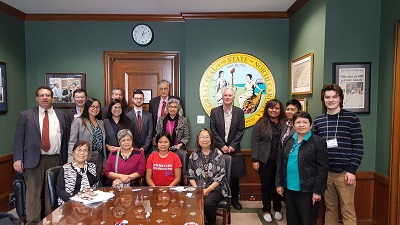 | |
A bipartisan bill in the US Senate that we supported, "The Philippine Human Rights Accountability and Counternarcotics Act of 2017," would enact human rights conditions on some law enforcement assistance to the Philippines, based on certifications by the US State Dept., while funding public health programs to address substance issues as well as human rights work. There was similar language in the current version of the Senate Foreign Operations Appropriations bill. We worked with a coalition that included Filipino American organizations and faith networks, and continue to support such efforts.
In April 2018, StoptheDrugWar.org's executive director David Borden was invited to join a lobbying group that included advocates visiting from the Philippines as part of the Stop the Killings Speaking Tour 2018 of the Caravan for Peace and Justice for the Philippines, as well as representatives of Filipino American organizations, faith groups participating in the Ecumenical Advocacy Days the weekend before, and others. Key organizers of the lobbying effort were the Ecumenical Advocacy Network on the Philippines and the International Coalition for Human Rights in the Philippines US Chapter. Borden is regularly asked by Filipino American advocates to address the drug war in meetings and demonstrations.
As the above sections show, we have actively sought partners in this campaign, both in the Philippines and in the Filipino American community, including groups spanning a range of the ideological spectrum. But we have also sought to bring others in to the effort -- from drug policy reform, international criminal justice advocacy, the anti-death penalty movement and others.
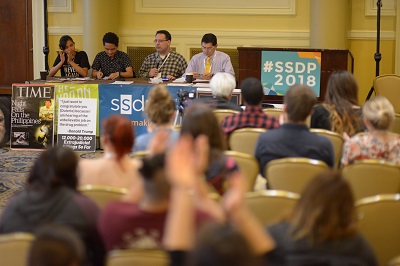 |
In March before heading to Vienna for our event with Senator Trillanes, we organized a panel for the Students for Sensible Drug Policy conference in Baltimore, "Human Rights Challenge, Responding to extrajudicial killings in the Philippines." Our panel featured Eric Lachica of US Filipinos for Good Governance; and Shamah Bulangis and Justine Balane, National Secretary General and International Secretary respectively of Akbayan Youth, who are also SSDP Ambassadors for the Philippines.
The panel was well attended, and following it, we brought signs from Philippines-related demonstrations (our 2/28 embassy protest and others) to the plenary hall, where conference attendees, following a group picture, took a second group pictures with the signs, while holding hands up in a Philippines protest symbol. The photo, posted to Facebook by an attendee, went viral in the Philippines.
The energy of the event and level of interest in this campaign that was shown there, following our successful protest a week earlier, makes us believe that a larger movement can be built on this issue, capable of bringing greater pressure on the Duterte administration over the killings. Please subscribe to our email list to be updated as plans progress, and feel free to contact us directly in the meanwhile.
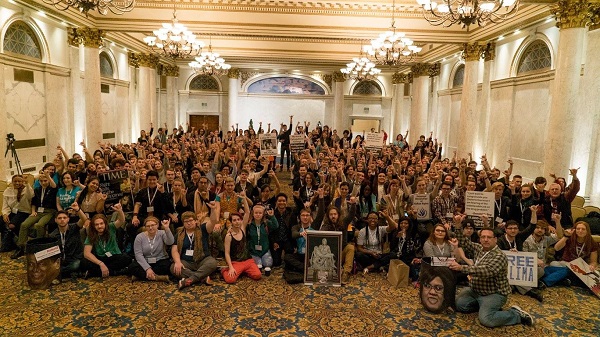
David Borden met with members of the Filipino American Human Rights Alliance San Francisco chapter in July 2018. In this video, filmed by FAHRA leader Ago Pedalizo, Borden remarks on the recent awarding of the prestigious "Prize for Freedom" award to Senator de Lima:
– END –

